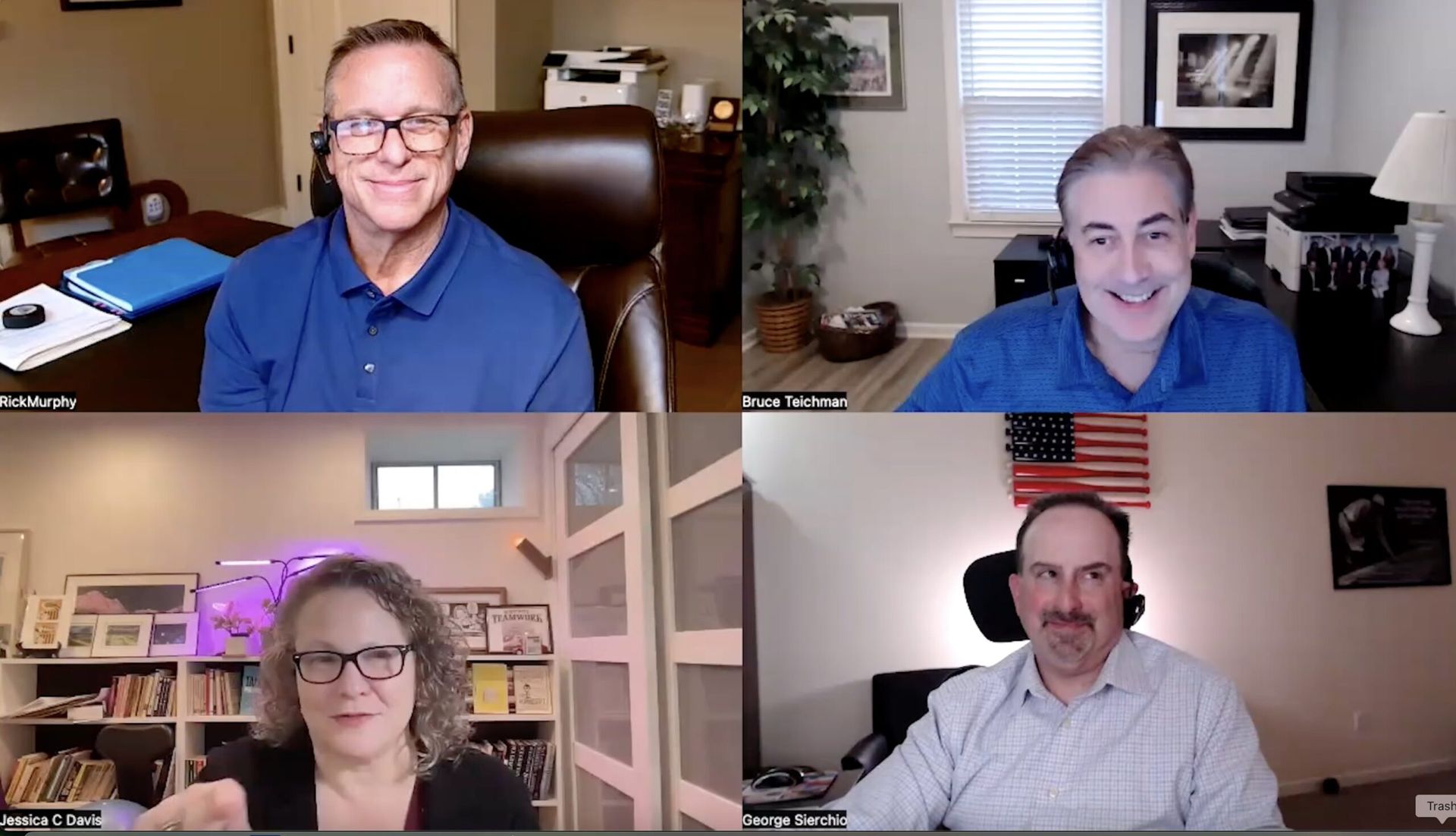- Standout Trends for MSPs in 2024
- MSPs Face Classic Business Challenges
- Growth Opportunities and Forecasts for MSPs in 2024
- Pagliuca’s Business Advice: Focus
- The Growth of Co-Partnering
- MSP M&A: Will the Slower Pace Pick Up in 2024?
- Cloud and Hybrid: Pagliuca’s Prediction for Future IT Estates
- Pagliuca on the Future of RMM
- How MSPs are Already Using AI

What’s in store for MSPs over the next 12 months? Cybersecurity. Solid revenue growth. More co-managed engagements. Experimentation with AI. But MSPs still face a host of business challenges and technology challenges going forward.
ChannelE2E sat down with MSP platform provider (RMM & PSA) N-able's CEO John Pagliuca to get his perspective on the managed services market and MSPs. We discussed the MSP Horizons Report, a 74-page comprehensive look at the state of the market today and all the information it captured on the state of the market for MSPs and what changes are in store in the years ahead. N-able collaborated with channel market analyst firm Canalys to create this report. The survey was conducted from October 2023 to November 2023, capturing feedback from 354 business-to-business channel partners across EMEA, North America, APAC, and Latin America. The report compiles the results of an online survey and qualitative interviews.
Pagliuca also shared his perspectives on what different-sized MSPs need to do to take their businesses to the next level--because the approach is not the same for small MSPs versus large MSPs.
Pagliuca and other N-able executives will address these challenges, opportunities and topics during the company’s annual conference for MSPs, N-able Empower, which will be held in Frisco, Texas this week.
Here are excerpts of the conversation ChannelE2E editorial director Jessica C. Davis had with N-able CEO John Pagliuca.
Standout Trends for MSPs in 2024
ChannelE2E: What are some of the trends that stood out to you in your Horizons report and in talking to MSPs?
Pagliuca: I have the good fortune of talking to MSPs quite a bit, so I'd say none of the answers or high-level trends surprised me. I think what surprised me was the level or depth of some of those trends. In particular, the willingness around this concept of co-partnering (partnering with another service provider on a customer engagement) I found to be more of a bigger movement than I expected. We've been talking about co-managed (an MSP working together with an internal IT organization), and we're seeing some MSPs walking into mid-market companies and larger companies and beginning to do a co-managed model.
I was surprised to see the level of folks that are willing to go at more of this partnership approach, which makes sense. I was glad to see it. I was happy to see it.
MSPs Face Classic Business Challenges
ChannelE2E: You’ve told me this report is intended to help MSPs evaluate new horizons they should be watching, but many of the classic business problems are still a piece of the puzzle, in your opinion. Tell me about that.
Pagliuca: One of the classic, basic things that still troubles MSPs today is finding new customers, right? And labor shortages and skill shortages. But when I double-clicked into it, especially with that new customer acquisition challenge, I found that it probably falls into two camps: First, the smaller, more immature MSPs, and then second, the bigger shops.
On the smaller shops, the lack of focus is what probably plagues the MSPs. They don't really have a sales team or a marketing team. They might be doing some type of advertising, but they don't necessarily have someone who's dedicated; waking up every day, trying to find the customer.
On the bigger side of that new customer acquisition challenge--it's not that they can't find the customers, but they might not be necessarily finding the right type of customer. And if you're an MSP that's scaling and you have now 50 or 100 or hundreds of customers, the best MSPs will tell you the key to success is understanding who is the right customer and who is the wrong customer. Landing the right type of customer can help advance your agenda forward and is super critical.
This didn’t surprise me, but it's a reminder that while technology continues to push us on and move the industry forward, some of the age-old fundamentals of the business--people, finding customers, retaining customers, finding staff, retaining staff, are still basic building blocks and pillars of the community.
Growth Opportunities and Forecasts for MSPs in 2024
ChannelE2E: The N-able MSP Horizons Report 2024 revealed that MSPs out there are really optimistic about their growth opportunities in 2024. It was surprising to me how optimistic they are. Were you surprised by those numbers, or did they make sense to you?
Pagliuca: This industry sits at the intersection of some major, major global and micro tailwinds, right? Whether it is cybersecurity and the push to compliance, folks moving to the cloud, the labor shortage across IT and cybersecurity- the MSP is at the intersection. Small and medium businesses need the MSP's help navigating all these other bits. The demand is there.
One of the challenges I ask MSPs about is, “Have you thought about your growth algorithm?”
What I mean by that is, if you're an MSP that's looking to grow 20%, how much of that growth is going to come from new customers? How much of that growth is going to come from expanding services in your existing customer base? And are you explicit and direct with your team and with your customers about how you're going to grow that? And I'm a little bit surprised sometimes when our MSPs say a big headline, like, 'I plan to grow 15%, 20%,' but then they don't really break it down by that growth algorithm.
I'm not surprised. I mean, look, 97% of all MSPs are planning to grow in some capacity. Two-thirds of the MSPs are planning to grow by double digits.
Pagliuca's Business Advice: Focus
My advice to the MSPs is, again, focus. Be really critical and explicit as to how you're going to grow. And there are different paths to reaching your top-line and bottom-line goals. Is it going to be new customer acquisition? Is it going to be expanding services?
It didn't surprise me just because more and more MSPs are mission-critical to small and medium enterprises, number one. And number two, bigger and bigger organizations are looking to MSPs for their services. When I started in this business many, many moons ago, MSPs were primarily targeting 50-employee shops and lower. But now MSPs are walking into companies the size of N-able, with 1,600 employees. And the persona that they're talking to is no longer the business owner or the founder, but they're talking to the IT director, they're talking to the CIO.
Why? Because that IT director or that CIO is looking at their budget and their hiring plan, and their org chart has “to be hired” all over it. And that's not Tom, Bob, and Harry, that's to be hired. Right? And so when the IT director says, 'OK, I need to bring in the staff, where am I going to find the staff? It's costing me this much. My CFO is trying to keep me to a budget. But hey, this really awesome alternative is for me to bring in an expert like an MSP to do a certain part of my business, a certain office or a certain task.'
All those reasons, in my opinion, are driving this double-digit growth that the industry is seeing.
The Growth of Co-Partnering
ChannelE2E: What do you think is driving that movement toward co-partnering? I mean, it seems like it's growing out there, right? Is it?
Pagliuca: I think it's a couple of things. I think there's overall a general maturity in the business. Number one. Number two, the labor shortage is driving it. And then frankly, the biggest driver is cybersecurity. A lot of MSPs recognize that it does not make business sense for them to go build a [security operations center] SOC, right? So if they want to go build a SOC, hey, for me to be in the security game at the level that some of my customers might need, I need cybersecurity experts. I might need a 24/7 SOC looking at these threats.
I need to invest in a tech stack that's going to be hundreds of thousands of dollars. And do I really want to take on all that risk? And most of the time, the answer should be no for a lot of these MSPs. And then the second part is, do I want to live with that risk? So augmenting or finding a partner eliminates those costs. They're putting a lot of the risk on that security expert, but they still can present themselves to the customer and say, hey, I've got your back.
Small and medium enterprises are not looking for a security firm and an IT firm. They're looking for an MSP to be that trusted advisor to do both. And that's why, by the way, we're going to market this quarter with N-able MDR. We saw the need.
MSPs are looking to offload some risk but still make sure that they are that trusted advisor for their small and medium business. And I think it's a great tool that, whether it be N-able MDR or just this concept of partnering--it's a level of maturity that I'm happy to see a lot of these MSPs beginning to lean into.
MSP M and A: Will the Slower Pace Pick Up in 2024?
ChannelE2E: Switching gears to mergers and acquisitions in the MSP market, last year was not as big a year as 2022. I think we were tracking a number that's between 350 and 400; you have about 400 M&As in your report there, which was down from the previous year. What are your thoughts on the decline in MSP M&A in 2023?
Pagliuca: Great question. Look, it really comes down to simple math. We're seeing more and more smart money, like private equity, come into the space. Private equity loves the MSP model. Why? Because it's recurring revenue, it's sticky customer, it's mission critical, it's recession resilient.
Why we saw a deprecation or a decrease in 2023 really just comes down to good old-fashioned math. Interest rates went up in 2023 at a faster clip than in my lifetime or your lifetime and I actually think it might have been the fastest ever in U.S. history. When interest rates climb, the cost of money goes up. If you're an acquiring company or a private equity shop, and you wanted to go acquire an MSP for $10 million, let's say, but you were going to do that with debt, you weren't going to come up with all of that money yourself, which you shouldn't. You should use the L word, as I like to say: Leverage.
The cost of that debt, that leverage, went up by 400 or 500 bps, 4% or 5%. So what might have cost you X hundreds of thousands of dollars in interest is now costing you two, three, four times that. It broke the equation for the return on investment for the MSP. My expectation, based on all indicators here, at least in the U.S., but also abroad, is that interest rates will drop in 2024, maybe in the middle part of 2024.
When you see that drop coming down, interest rates will go down, the cost of money will go down. We will see an uptick in mergers and acquisitions once again, because the MSP community is ripe for consolidation at the service provider level. And it's such a great model that someone in a private equity shop or a bank can underwrite the assumptions or the business because of strength and the revenue that these MSPs have created.
ChannelE2E: What I've heard is, and your report really bears it out, too, is that a very small number of MSPs are looking to sell or are good acquisition targets right now. And there are lots of people interested in buying them. The supply doesn’t match the demand. It sounds like you've seen the same things.
Pagliuca: I think it was like 13% said they'd be interested in selling, and 87% said, 'Hell no.' And so what that tells me is that the MSPs, rightfully so, believe there's more opportunity in the future than there was in the past. And so this is good old-fashioned Wall Street, right? You don't sell low and buy high. You buy low and sell high. And what this tells me is, overwhelmingly based on the survey that we produced, that MSPs see more opportunity tomorrow, so why would you sell if I'm going to be bigger, I'm going to grow and I'd rather grow my business and get my return once I'm growing my business.
This was a really clear indicator of the real confidence index of the MSP community. They're saying, 'Hey, my business will be healthier, will be bigger, will be more profitable in the future.' And leaning into that opportunity. And then maybe I'll think about selling. But it also tells me our MSPs are having fun. They're having fun growing their business. They're having fun tackling these technical challenges that are in front of them and the SME. So it's all a good indicator that the channel is very healthy.
Probably the biggest thing is that it's really a confidence index as to the opportunities that lie in front of us. It's putting your money where your mouth is, where you're saying, hey, I'm not looking to sell. I'm looking to grow my business for a future outcome.
Cloud and Hybrid: Pagliuca's Prediction for Future IT Estates
ChannelE2E: And speaking of the technology, one of the things you looked at in this report is the different types of technologies that MSPs are deploying. And many said they were operating a hybrid management model for on-premises and cloud environments. What are some of the other key technology trends that you see as far as MSP stacks are concerned?
Pagliuca: I think one of the myths to debunk is that the world will be 100% cloud-based. We all know the world inevitably is going to be hybrid, right? What that means is that the MSP, as they move to the cloud and a lot of MSPs have now brought their entire estate to Microsoft 365, as an example, and gone are a lot of the Microsoft Exchange Servers.
They've absolutely mothballed some of the on-premises world. But we know that there might be more client-focused or industry-focused software that's going to continue to be in servers across the globe and closets of small to medium enterprises across the globe. We all know that the physical devices, there's still data and the need to manage the physical devices and protect the physical devices, whether it be your laptop, your server, or your mobile device is still critical.
One of the important things for me is making sure that MSPs understand it's going to be a hybrid world. Plan accordingly—technology has a long tail. It's going to be hybrid, not just from the cloud but also from the different operating systems. That's not going away. MSPs need a unified management platform that they can use to manage the cloud, physical devices, Apple devices, and Linux devices.
Pagliuca on the Future of RMM
Pagliuca: People always ask, hey, is the RMM--and I think the survey actually solidified this as well--is the RMM defunct? Is the RMM not necessary?
As long as there's something between the screen and the back of a chair--i.e. the user--the MSPs and the RMM are super required because the RMM is effectively the conduit or the fabric where the MSP can monitor and manage devices for all these customers across their estate in an efficient way. And that's the key part. And because of the hybrid nature of the environments from now and for at least the next five to 10 years, and who knows beyond that, the RMM still remains the central operating system for these MSPs to do their jobs at scale efficiently, train their technicians, and hopefully run a bunch of automation and scripting so they can do their jobs efficiently.
ChannelE2E: Will RMM evolve to meet some of the new challenges?
Pagliuca: One hundred percent it is evolving. Look, the MSP center, in my opinion, is now really all around security. RMM is evolving with that, and we've invested a good amount to make sure that we make IT and security easy for the MSP. That's why we've done these integrations with our EDR capability so an MSP can monitor and secure an endpoint in the same screen at the same time, leveraging the same policy with the right click of a button that can make sure that their customers are secure.
You're seeing this confluence and the RMM won't just be a monitoring and management platform, it really needs to be that security platform for these MSPs deploying backup, making sure that they can restore in the case of something nefarious happens, making sure the endpoints are protected, making sure there's web, there's content filtering on their devices. RMM is evolving to more of the security platform for the MSP. It’s also evolving, leveraging a bunch of different automation as well.
The last leg is what are we doing for cloud? Can the RMM help you manage your Microsoft stacks, right? And all the different clouds that Microsoft has -- can the RMM help you with AWS? That's the natural evolution of unified management of different operating systems, the different cloud environments, and this ability for MSPs to secure their customers as well.
How MSPs are Already Using AI
ChannelE2E: You had a whole section in your Horizons report -- great report, by the way -- about AI and how MSPs are already using AI. I did not know that so many MSPs were experimenting with AI in-house. I wonder if that was a surprise to you, and where you see that going?
Pagliuca: This one was a surprise to me. I think the report said 45% of the MSPs are using it embedded in their products in some way or another, so that was a surprise to me. I guess it shouldn't have been, right? Our MSPs, they're technologists, right? And they want to tinker, and they want to make sure that they're using bleeding-edge technology to help their customers and help their business. But yeah, I was surprised at the breadth and depth. And hopefully, what this report will be for some out there--there's a little bit of a wake-up call.
As the report calls out, and as you're calling out, it's not in the land so far away. It is in the here and now. And if you're not beginning to leverage this technology, you will be left behind, period, end of story. We're using it here at N-able in our R&D to make sure that we can gain efficiencies with our engineers, but also efficiencies, but also making sure that we're writing code in a more secure manner. My sales and marketing teams are using AI in a very responsible way.
We're beginning to use these machine-learning languages in a way that we can help propel ourselves, which hopefully propel our customers, too.
At the beginning of the report, I started with a little bit of a letter. And the letter really is kind of a reminder of this concept of a Future Shock. The premise here is that as the rate of technology is going faster and faster, it's actually putting more stress and duress on folks because people don't like change. And if you're not willing to adapt to that change, it adds additional stress to your life. And as a business owner, it puts additional stress on your business. What we need to do is understand and absorb the rate of change so we're not left with this Future Shock.
The best way to avoid that future shock is to think about the rate of change and how that impacts your business and your customers' business. Because that's the other thing, I want the MSPs to make sure they hear loud and clear: It's not just their businesses that are using Chat GPT and all these AI tools. It's their customers' businesses. And where they can continue to add value up that chain is by helping their customers navigate the ins and outs, the do’s and don'ts, of AI to help their customers' businesses really leverage this business so that they're not themselves in a state of Future Shock.





